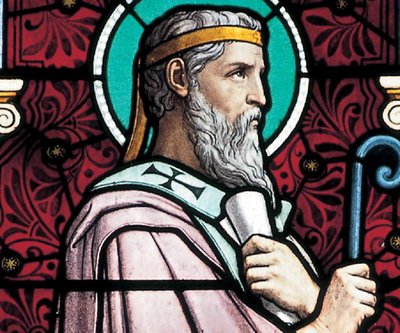Thoughts for the Day
Saturday, 28th June 2025: Irenaeus, Bishop and Teacher (c200 CE)
Saint Irenaeus 2 Peter 1 Gnosticism Irenaeus Teacher
Reading : Verses from 2 Peter, Chapter 1

For we did not follow cleverly devised myths when we made known to you the power and coming of our Lord Jesus Christ, but we had been eyewitnesses of his majesty. For he received honour and glory from God the Father when that voice was conveyed to him by the Majestic Glory, saying, ‘This is my Son, my Beloved, with whom I am well pleased.’ We ourselves heard this voice come from heaven, while we were with him on the holy mountain.
So we have the prophetic message more fully confirmed. You will do well to be attentive to this as to a lamp shining in a dark place, until the day dawns and the morning star rises in your hearts. First of all you must understand this, that no prophecy of scripture is a matter of one’s own interpretation, because no prophecy ever came by human will, but men and women moved by the Holy Spirit spoke from God.
(Lectionary, New Revised Standard Version)
Thoughts
We were reminded recently of the importance of those who taught the faith in earlier century. Today we look at the 2nd century to a man whose work still affects our understanding of our faith today. We remember St Irenaeus who was born of Greek parents, probably in Asia Minor c130 CE, and died c200 CE. He became the Bishop of Lyon and a leading theologian, known for his fight against Gnosticism.
This dangerous heresy was very difficult to eradicate in the early church. It was influenced by philosophers like Plato and argued that there was a difference between spirit and matter (ie physical things). Matter was considered evil but spirit was good. For Gnostics therefore Jesus could not be a real material human being (for he would be made of matter), and they developed the idea that he was really a spirit. This made nonsense of the fact that Christians believe he truly suffered and died for us, and that he was fully man and God.
Gnostics also believed that they possessed knowledge that others didn't have and that we were saved from our sin through knowledge. This is against all that we understand, for we believe that we are forgiven and saved not through knowledge but through faith. It is thanks to the work of Irenaeus that we have our Nicene Creed's emphasis on the place of Jesus. While the words of this creed were being agreed we should never forget that many christians were exiled or even killed in their fight against Gnosticism, and that sometimes it still rears it head over discussions concerning Jesus Christ where He is deemed less than equal to God the Father.
Prayer
Collect for Irenaeus
God of peace,
who through the ministry of your servant Irenaeus,
strengthened the true faith
and brough harmony to your Church,
keep us steadfast in your true religion,
and renew us in faith and love,
that we may always walk in the way that leads to eternal life;
through Jesus Christ your Son our Lord.
Amen.
If you want to know more about Gnosticism, this site gives an overview:
See the earlier Apostles' Creed (used at Morning and Evening Prayer) and the later Nicene Creed (used at Holy Communion) produced side by side and notice the differences to try and settle the gnostic arguments. This Creed was initiated at the Council of Nicaea in 325 CE, but changes were made over the years. This version is from the Book of Common Prayer (1979).